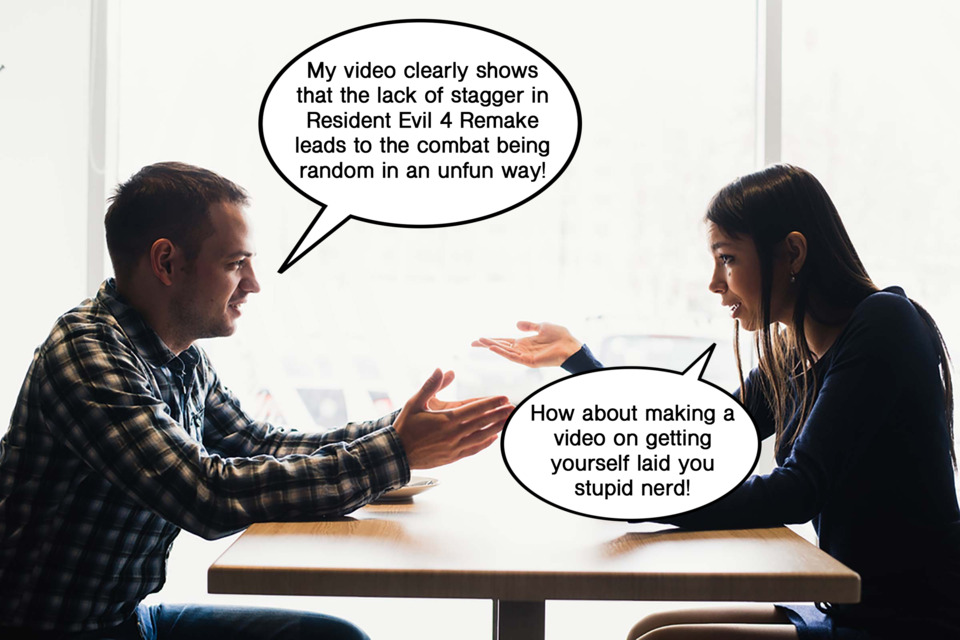The purpose of video game discourse
By PurpleShyGuy 15 Comments
Why do we do it, why do we enjoy it?
I have a confession to make: I’ve kind of been stuck on what topic to write about. Every couple months or so I like to do a post on something that has gained my interest, but lately I’ve been struggling to finish anything. At first I was going to write about remasters and remakes, and the fine line between preserving gaming history and rewriting it for better or for worse. Then my focus shifted on Zone of the Enders 2, since Armored Core 6 has just released and with them both being about giant robots, I saw an opportunity to lavish praise on a game that you should really play if you haven’t already. Finally I thought screw it, and was going to go for the low hanging fruit by talking about the latest season of the anime Baki, which has some absolute pearls of dialogue such as “they weren’t even aware of the fact that they were unconscious.”
But what is at the heart of all this when you really think about it? At the heart of this website that you are reading these words on? Video game discourse of course! And it is everywhere, discussing all manner of video game related things. No game is too obscure to not have a fan breathlessly gush about it in an article, and no gameplay change is too small to not warrant a video explaining the latest updates a new season brings. Everything is analysed and discussed and argued, but why though? Sure, there are reviews to influence a purchasing decision and news sites to tell us all the hot new releases, yet we sometimes seek videos and articles on games we’ve already bought and beaten. And it’s not like talking about video games has any real practical application, you can’t prevent mould buildup in your house with the fact that you know Jonathan Blow’s Braid is actually about the atomic bomb.
So why not actually just play Braid again instead of looking up stuff about it online? One somewhat cynical answer is that we are looking for others to validate our opinion. When we feel positively about a game it can be reassuring that others share our viewpoint — especially from those we respect — and in a strange way it confirms that our happiness towards something was right, even though that shouldn’t actually make any sense. If we’ve had a negative experience with a game, however, there certainly can be a catharsis in hearing someone express the same hatred towards it. I remember how relieved I was when I saw the Zero Punctuation on Ni No Kuni, since I wasn’t the only one who thought the game’s combat was a hybrid monstrosity that should have been put out of its misery.

Though, beyond just the simple gratification of hearing people agree with us, there are other reasons why video game discourse exists. It can help us to solidify opinions or feelings we have that we can’t quite complete on our own. Bioshock Infinite is a standout example for me, since I was swept up in all the per-release hype and couldn’t put into words why I was left a little cold when I hit credits. What helped me was Matthewmatosis’ Bioshock Infinite Critique, which did put into words all the ways the game had felt lacking to me. While exposing yourself to too many opinions can run the risk of muddying yours, they can often be used to aid in shaping and defining our own experiences.
And then there are games which beg for discourse, beg for minds to ruminate and discuss their cryptic meanings. Signalis is absolutely one of those games, because even when I completed my playthrough and had my own thoughts on it, I wouldn’t say that I felt satisfied so to speak. Indie Xplorer’s A Complete Story Breakdown of Signalis really made me appreciate the game on a whole other level, pointing out details and story threads that I would have never discovered on my own. In this way, discourse can actually be a part of the intended experience. Developers aren’t ignorant of the fact that their games will be dissected to death, so why not give them plenty to dissect?
My final reason is that discourse can give you new insight on a subject you had previously thought you had all figured out. Sexuality, Gender and Kojima Productions by Transparency is one such opinion piece. It takes the humorous scene where Sam Bridges in Death Standing punches the player for looking at his crotch, and manages to make the solid argument that it creates some unintentional commentary on how Hideo Kojima sees objectifying men compared to objectifying women. I adore these kinds of videos and articles because they can completely change how you perceive something, challenging you to think more critically.
I suppose when I talk about video game discourse, you could really broaden that to any discussion about any hobby, such as films, books, music, sports or Japanese cartoons about big muscle men punching each other absurdly hard. Yes, video games aren’t important when compared to stuff like having a decent wage to live on or your physical and mental health, but like many other seemingly frivolous joys they give flavour to our lives. And people like sharing in that joy (or that hate), people like to obtain a greater understanding, or fashion an entirely new one. And it can be great to express those views, seeing our thoughts materialise into something that others can read or watch. In Nier Automata you are asked a question: do you think video games are silly little things? I hope that by reading this you now know my answer.
